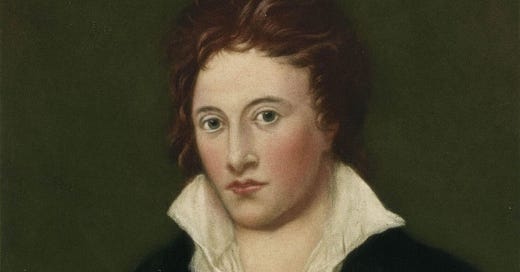Celebrating the Promethean Spirit of Percy Bysshe Shelley (4 August 1792 – 8 July 1822)
By David Gosselin
Featured in New Lyre Summer 2022
July 8th marked the date of Percy Bysshe Shelley’s unfortunate drowning in the Bay of Lerici, Italy. Despite the considerable sea of time that separates us from the age in which Shelley lived, the poet’s significance has by no means diminished. In our age of increasing cultural chaos, aggressive censorship, and rearing social anarchy, the Promethean spirit of Shelley’s work remains alive and well.
One of Shelley’s most ambitious compositions, Prometheus Unbound (1818-1819), took the form of a lyrical drama. Inspired by a fervent spirit of classicism, the poet revisited one of the most famous and compelling Classical Greek myths: the Titan Prometheus’ stealing of fire from the gods of Olympus and giving it to humankind.
For some, including the Greek poet Hesiod and Shelley’s own wife, Mary Shelley, the Promethean myth was viewed as a cautionary tale about humankind’s hubris in the face of divine authority and the natural order of things. For poets like Shelley and Aeschylus, however, Prometheus did not represent any kind of utopian scientism or the creation of transhumanist Frankenstein monsters. Rather, the Titan Prometheus symbolized the rejection of oligarchical systems of control, typified by the hereditary power structures dominating the Europe of Shelley’s age in the aftermath of Congress of Vienna. Shelley elaborated a Promethean vision of the human species endowed with a unique creative spark that gave it the capacity to unearth the natural laws of the universe and harness new forms of “fire”—despite the gods.
In Aeschylus’ Prometheus Bound—the only surviving fragment of the original Greek trilogy on which Shelley modeled his Prometheus Unbound—the immortal Titan sings of the state in which he found humankind before he gave it the gift of “fire.” Prometheus speaks of having found men dwelling in “burrows of their unsunned caves,” living like “phantoms huddled in dreams, the perplexed story of their days confounded.” They possessed knowledge of neither “the fixed signs” of winter nor spring “when she comes decked with flowers.” Men remained “senseless as beasts” until the Titan showed them “the rising of the stars” and “gave them writing that retaineth all.”
For Shelley, poets and artists had a unique role to play in spreading this “fire,” in defiance of the arbitrary “gods” and their censors. Indeed, as we see with Mozart’s operas like Don Giovanni, Beethoven’s Fidelio, or the works of Friedrich Schiller, to name a few, song and poetry were a powerful means of challenging and polemicizing against some of the most entrenched and aggressive systems of control. Poetry was not merely some panegyric art made to glorify the rulers of the day, or simply an escape to some Romantic dream world. Instead, poetry was seen as the divine spark that made the birth and spread of new such “fire” possible.
Keep reading with a 7-day free trial
Subscribe to The Chained Muse to keep reading this post and get 7 days of free access to the full post archives.




